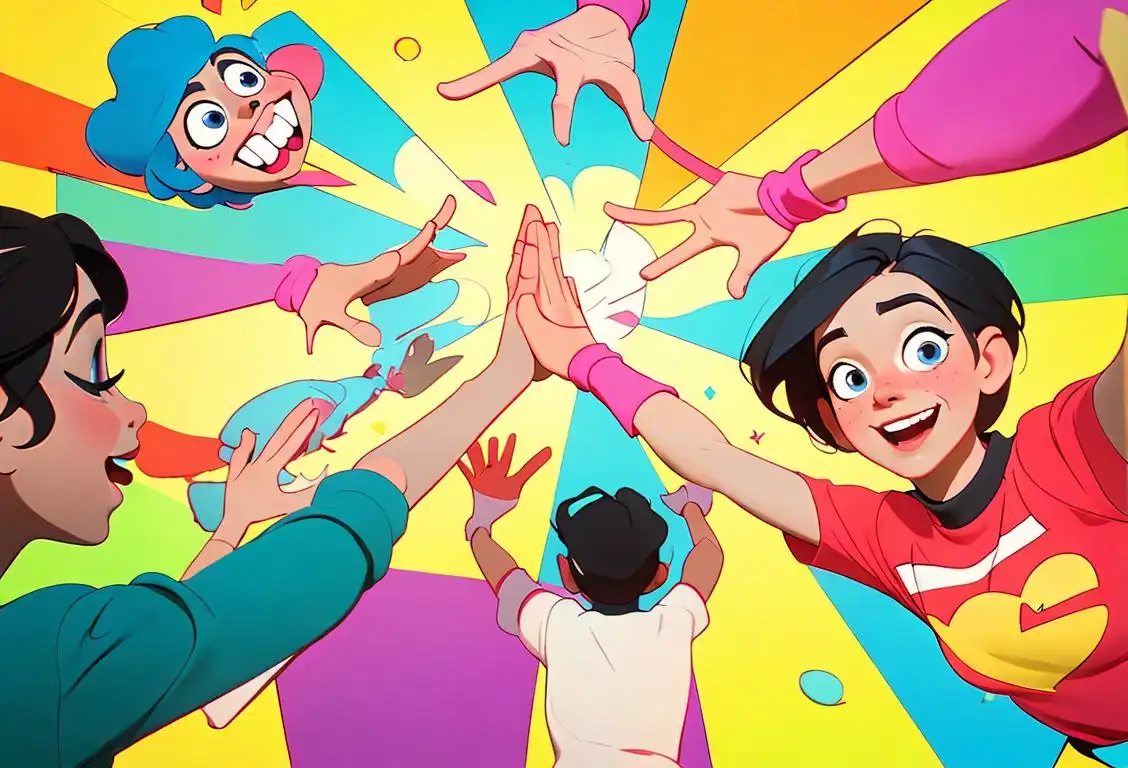National Inane Answering Message Day

Happy National Inane Answering Message Day! Get ready to celebrate the art of leaving ridiculous, pointless, and downright nonsensical voicemail messages. Whether you're dialing up friends, family, or even unsuspecting strangers, today is the perfect excuse to unleash your inner prankster and embrace the absurdity of it all. So grab your phone, crank up the wackiness, and let's dive into the hilarious history of this bizarre national day!
When is Inane Answering Message Day?
It's national inane answering message day on the 30th January.
The Origins of National Inane Answering Message Day
Everyone loves a good prank, especially when it involves a phone and a bewildered recipient on the other end. National Inane Answering Message Day was born out of a desire to celebrate those awkward, cringe-worthy, and often nonsensical answering machine messages that have the power to make us laugh out loud.
While the exact origins of this wacky holiday are somewhat unclear, it is believed to have emerged in the early days of answering machines. Back in the prehistoric era before smartphones and instant messaging, answering machines were all the rage. People would painstakingly record personalized messages to greet callers, and some creative souls decided to inject a little humor into the mix.
Over time, these humorous answering machine messages became a bizarre art form, with people competing to come up with the most ridiculous and entertaining greetings. From singing dogs to outrageous impersonations, the possibilities were endless. It didn't take long for someone to realize that these quirky messages deserved a day of their own, and thus National Inane Answering Message Day was born!
Celebrating National Inane Answering Message Day
Now that you know the history, it's time to join in the festivities and embrace your inner comedian. Here are a few ideas to make the most of this delightfully absurd holiday:
- Create an outrageous answering machine message: Dust off that old answering machine or update your voicemail and let your imagination run wild. Channel your inner comedian and come up with a greeting that will leave callers in stitches.
- Leave inane messages for friends and loved ones: Become a master of absurdity and leave hilariously pointless voicemail messages for your nearest and dearest. Just remember to keep it light-hearted and fun!
- Organize an inane answering message contest: Challenge your friends, family, or colleagues to a friendly competition. See who can come up with the most ridiculous, mind-boggling, and utterly inane answering machine message. May the most absurd greeting win!
- Spread laughter, not annoyance: While pranks and humor are at the heart of National Inane Answering Message Day, it's essential to be mindful of others. Avoid leaving offensive or truly irritating messages that may upset or annoy your recipients. The key is to bring joy and laughter, not frustration!
Did You Know?
Did you know that the longest recorded voicemail message in history lasted a staggering 59 hours and 55 minutes? It was set by a dedicated prankster who was determined to break the record for the most mind-numbing and inane voicemail message imaginable. Now that's what we call commitment!
History behind the term 'Inane Answering Message'
1978
The dawn of answering machines
In 1978, the first commercial answering machines were introduced to the market. These devices allowed individuals to record and store messages when they were unable to answer the phone. As a result, a new form of communication emerged, shifting the way people interacted with one another over long distances.
1971
The Emergence of the Answering Machine
In 1971, the first commercially available answering machine was introduced by PhoneMate. This device revolutionized communication by allowing individuals to record voice messages when they were unavailable to answer the phone. Initially, answering machines were primarily used by businesses, but they soon found their way into the homes of consumers as well.
1976
Origins of the Answering Machine
In 1976, the first commercially successful answering machine was introduced by Electronic Secretary Industries. This revolutionary device allowed individuals to record incoming phone messages when they were not available to answer the phone. The answering machine quickly became a popular household item and changed the way people communicated.
1971
Origins of the answering machine
The first commercial answering machine, known as the 'answering and recording machine', was introduced by PhoneMate in 1971. This device allowed people to leave messages for the recipient when they were unavailable to answer the phone. It revolutionized the way people communicated by providing a convenient way to store and retrieve voice messages.
1979
The birth of inane answering messages
In 1979, with the increasing popularity of answering machines, people started to customize their outgoing messages. It was during this time that some creative individuals began to experiment with humorous, witty, or absurd answering machine messages. These messages often contained jokes, funny anecdotes, or entertaining recordings that would amuse callers while waiting for the beep to leave their own message.
1985
Witty and humorous answering messages gain popularity
As answering machines became more widespread, people started to experiment with their voicemail greetings. In 1985, the term 'inane answering message' started to gain attention. Rather than using traditional, formal greetings, individuals discovered the creative potential of leaving witty and humorous messages to entertain callers. This approach added a fun and lighthearted touch to a previously mundane task.
1980
Introduction of Personalized Messages
In 1980, a major advancement in answering machine technology occurred with the introduction of personalized messages. People started to add unique and creative messages to their answering machines, reflecting their personalities or providing humorous or informative content. This allowed individuals to personalize their communication even when they were not present.
1978
The Birth of Annoying Messages
As answering machines became more commonplace, people started experimenting with personalized messages to entertain or inform callers. In 1978, an answering machine enthusiast named Ted Giannoulas unintentionally coined the term 'inane answering message' by leaving a quirky and nonsensical message on his answering machine. The message gained attention from friends and acquaintances who found it amusing, leading to the birth of the term.
1980
Inane answering messages go viral
By the 1980s, inane answering messages became a cultural phenomenon. As more people embraced the use of answering machines, creative and attention-grabbing messages started to spread rapidly through word of mouth. Friends, family, and even strangers would call each other's phone numbers just to hear the amusing and inventive answering messages. This viral trend sparked a wave of creativity and encouraged individuals to come up with increasingly clever and entertaining greetings.
1992
The Rise of Inane Answering Messages
By 1992, people began experimenting with unconventional and inane answering messages. These messages often deviated from the traditional informative or professional content, instead opting for humor, absurdity, or quirky statements. People realized that answering machines provided an opportunity for self-expression and entertainment, leading to the popularity of inane answering messages.
1980
Rise of Prank Messages
By the 1980s, the notion of leaving inane messages on answering machines gained popularity among pranksters. People would intentionally record bizarre, humorous, or nonsensical messages to surprise and entertain callers. This trend created a new form of social entertainment, showcasing people's creativity and sense of humor through their answering machine recordings.
1990
Answering machines become a cultural phenomenon
By the 1990s, answering machines had become a cultural phenomenon. People eagerly awaited calls, not only to hear from loved ones but also to experience the entertaining answering messages left by their friends and acquaintances. The 'inane answering message' became a term used to describe voicemail greetings that conveyed minimal useful information but sparked joy and laughter.
1990
Inane answering messages in the media
During the 1990s, inane answering messages gained further attention through popular media. Television shows and movies often depicted characters leaving humorous or ridiculous messages on answering machines, further solidifying the cultural significance of this phenomenon. This exposure in the media led to even more people adopting inane answering messages as a means of personal expression and entertainment.
2000s
The rise of social media and decline of answering machines
With the advent of social media and smartphones in the 2000s, the popularity of answering machines started to decline. People shifted towards texting and instant messaging as preferred methods of communication, rendering the 'inane answering message' less prevalent. However, the term remains a nostalgic reminder of an era when personal creativity in voicemail greetings brought delight to people's lives.
1992
The Phone Message Culture
During the early 1990s, the culture of leaving inane answering messages evolved into a social phenomenon. It became a way for individuals to express their personality, unique style, and creativity. People started sharing their favorite answering machine messages, leading to competitions and even radio shows featuring the best and funniest messages. The popularity of these messages highlighted the cultural impact of the term.
2000
Viral Spread and Internet Memes
With the advent of the internet and social media platforms, inane answering messages gained even more popularity. People started sharing recordings of these messages online, and they started to gain viral attention. This led to the growth of internet memes centered around outrageous and hilarious answering machine messages, further popularizing the concept.
Present
Inane answering messages in the digital age
In the digital age, inane answering messages have evolved alongside advancements in technology. With the rise of voicemail systems, text messaging, and social media, the traditional answering machine has largely been replaced. However, the spirit of inane answering messages lives on as people continue to find creative ways to entertain callers with personalized voicemail greetings, funny text message replies, or witty social media bios.
Present
Continued Creativity and Expression
Today, inane answering messages continue to be a way for people to showcase their creativity and sense of humor. With advancements in technology, voicemail systems and mobile phone message recordings have replaced traditional answering machines, but the concept of inane answering messages has remained. People now use various platforms, such as social media or sound-based communication services, to share their witty or absurd messages with a larger audience.
Present
Digital Age and Voicemail
With the advent of smartphones and digital communication, traditional answering machines have become largely obsolete. However, the concept of leaving inane answering messages lives on in the form of voicemail greetings or personalized voicemail messages. People continue to use humor, creativity, or clever wordplay to entertain callers, adapting the traditional answering machine culture to fit the modern digital age.
Did you know?
Did you know that the longest recorded voicemail message in history lasted a staggering 59 hours and 55 minutes?Tagged
fun loved ones humor pranksFirst identified
30th January 2017Most mentioned on
30th January 2017Total mentions
14Other days
Inane Answering Message Day
Shenanigans Day
Bs Day
Tittyslap Day
Step In A Puddle And Splash Your Friend Day
Humbug Day
Hin Day
Fool Day
Awkward Moment Day
Surprise Drug Test Day






